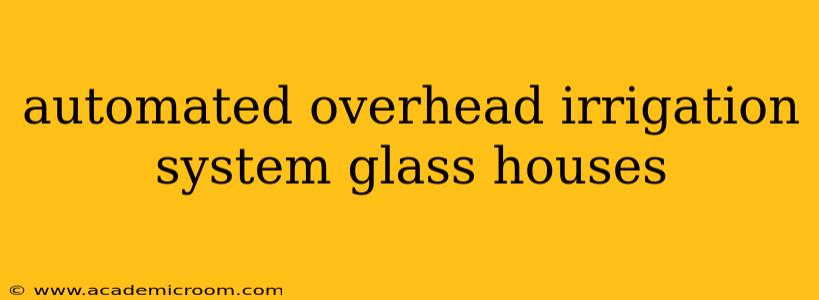Automated overhead irrigation systems are crucial for maintaining optimal growing conditions in glasshouses. They offer precise control over watering, leading to healthier plants, higher yields, and reduced water waste. This guide explores the intricacies of these systems, answering common questions and providing insights for successful implementation.
What are the benefits of using an automated overhead irrigation system in a glasshouse?
Automated overhead irrigation systems offer a multitude of benefits compared to manual watering. Firstly, they provide consistent and even water distribution, eliminating the inconsistencies of manual watering and ensuring all plants receive adequate hydration. This leads to improved plant health and growth, resulting in higher yields and better quality produce. Secondly, automation saves time and labor, allowing growers to focus on other essential tasks. Furthermore, these systems often incorporate sensors and controllers that optimize water usage based on environmental conditions, leading to significant water savings and reduced operational costs. Finally, automated systems can be programmed to deliver precise amounts of water at specific times, catering to the unique needs of different plant species and growth stages.
What are the different types of automated overhead irrigation systems for glasshouses?
Several types of automated overhead irrigation systems cater to varying needs and budgets. The most common include:
-
Drip irrigation: This method delivers water directly to the plant's root zone through a network of tubes and emitters, minimizing water loss through evaporation. It's ideal for precise watering and is particularly effective in glasshouses with densely packed plants.
-
Sprinkler irrigation: This involves using sprinklers to distribute water overhead, simulating rainfall. Sprinkler systems are suitable for larger glasshouses and crops that benefit from overhead watering. Different sprinkler types, such as impact sprinklers and rotary sprinklers, offer varying coverage and water distribution patterns.
-
Micro-sprinkler irrigation: This system provides a balance between drip and sprinkler systems. Micro-sprinklers deliver water in a gentle spray, ideal for delicate plants or seedlings, while still covering a larger area than drip irrigation.
How much does an automated overhead irrigation system cost for a glasshouse?
The cost of an automated overhead irrigation system varies significantly depending on factors like glasshouse size, the type of irrigation system chosen, the level of automation, and the inclusion of additional features such as sensors and controllers. A simple system for a small glasshouse might cost a few hundred dollars, while a sophisticated, fully automated system for a large commercial glasshouse could cost tens of thousands of dollars. It is crucial to obtain quotes from multiple suppliers to compare costs and features.
How do I choose the right automated overhead irrigation system for my glasshouse?
Selecting the appropriate system depends on several factors:
- Size and layout of your glasshouse: Larger glasshouses may necessitate a more complex system with multiple zones and controllers.
- Type of plants grown: Different plants have varying water requirements, influencing the choice of irrigation method.
- Budget: Setting a realistic budget early in the planning process is essential.
- Water source and availability: The system needs to be compatible with your available water source.
- Level of automation desired: Consider your level of technical expertise and the degree of automation you require.
What are the maintenance requirements for an automated overhead irrigation system?
Regular maintenance is crucial to ensure the longevity and efficiency of your irrigation system. This includes:
- Regular inspection: Checking for leaks, clogged emitters, or damaged tubing.
- Cleaning: Flushing the system periodically to remove sediment buildup.
- Calibration: Ensuring accurate water delivery.
- Filter maintenance: Regular cleaning or replacement of filters to prevent clogging.
By understanding the benefits, types, costs, and maintenance requirements of automated overhead irrigation systems, glasshouse operators can make informed decisions that optimize plant growth, water usage, and overall profitability. Remember to consult with irrigation specialists for personalized guidance and system design.
